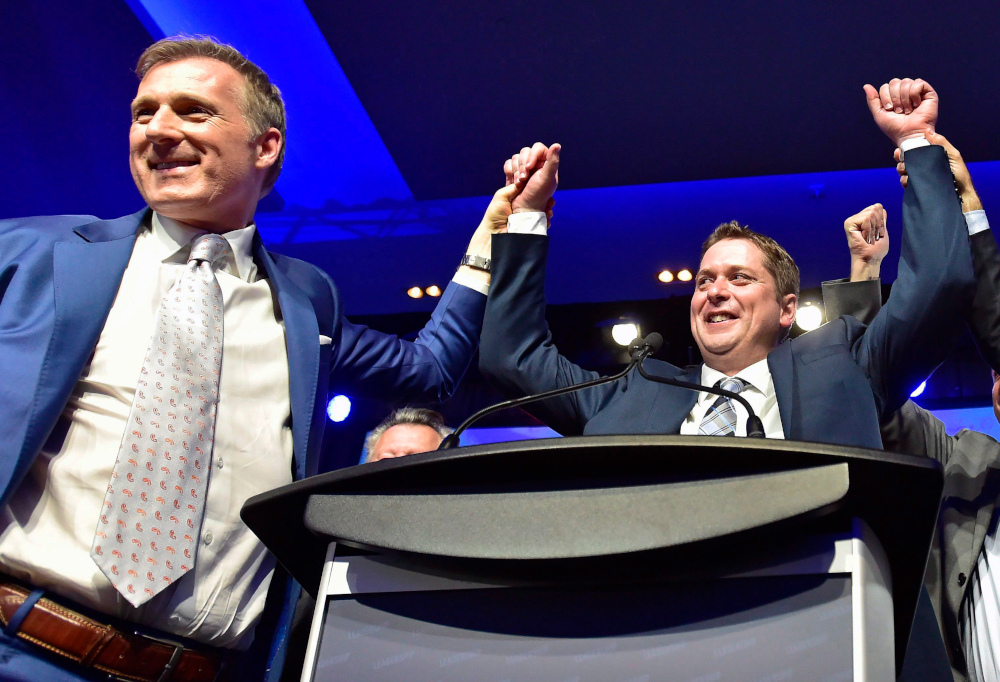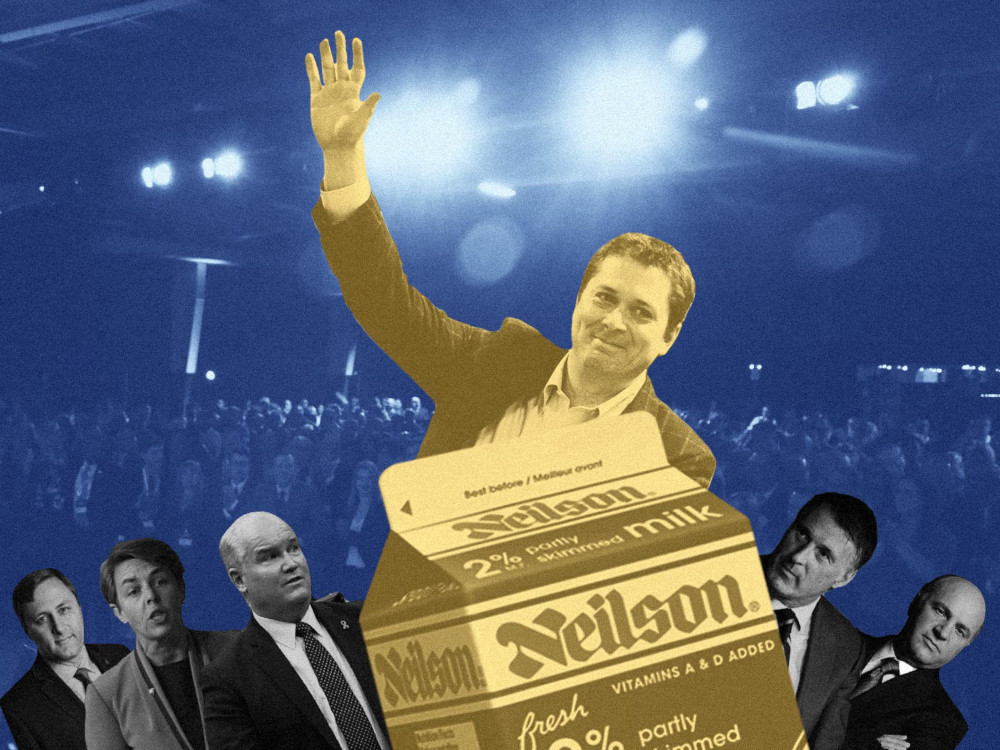Big Oil gets a lot of conspiratorial press. Big Pharma is widely reviled. The 2017 Conservative leadership convention was surely the first to prompt discussions about the power of Big Milk.
So startling and disappointing was Andrew Scheer’s victory to some Tories, they floated a theory. The prairie transplant Scheer was in the tank for socialist dairy farmers. Except, in fact, Scheer proved the most popular choice for right-wing hard-liners when their key votes were up for grabs at the tail end of a political marathon for the ages.
And who knows how he may have benefited from never-solved voting “irregularities”? If you are still trying to understand why Scheer is this close to being our next PM, so are a lot of Conservatives, left scratching their heads over how he became their leader.
It’s perhaps inevitable that any right-wing leadership contest held in 2017 would be conducted in the fetid shadow of President Donald J. Trump. Following his 2016 U.S. election victory, many Canadians assured themselves that this country was different, not likely to respond to a campaign of equal parts boorish insult, contempt for law and democracy, religious intolerance, and not-really-concealed racism. Yet it was clear that at least some of the candidates running to replace Stephen Harper as Conservative leader were intent on testing that belief. Of the 14 declared candidates, the two main Trumpeters were Kellie Leitch and Kevin O’Leary.
O’Leary, businessman and star of Dragon’s Den and Shark Tank, played the role of Trumpian rule-breaker, the candidate who defies convention, ignores traditional standards of decency and decorum and lets fly straight from the id. Like Trump, O’Leary succeeded in getting the lion’s share of free media with his carnival barker routine. Many polls showed him in the lead. But perhaps victory was never his plan. At any rate, a month before the convention he dropped out, citing his inability to speak French. Apparently, he only discovered this handicap on April 26, possibly while attempting to order a cafe au lait.
Leitch, lacking a history of TV stardom, opted for another page of the Trump songbook — the crude appeal to prejudice. Leitch called Trump’s triumph “an exciting message and one we need delivered in Canada as well.” Clearly, she was offering herself as the FedEx driver. Leitch, who had been the face of the Conservatives’ “barbaric cultural practices” snitch line proposal during the 2015 election campaign, now suggested a “Canadian values” test for immigrants as well as the de-funding of the CBC.
But a good Elvis impersonation requires more than knowing the words to “Heartbreak Hotel,” and Leitch’s Trump act managed to look opportunistic, ugly, and unconvincing.
A surprising number of high-profile Conservative figures had opted out of the race, including Jason Kenney, Dianne Watts, Peter MacKay, James Moore, and Rona Ambrose. Tony Clement dropped out early, citing lack of funds. Aside from O’Leary, the frontrunner in pre-convention polling was Beauce MP and former minister of foreign affairs Maxime Bernier.
Bernier back then
If you are a newcomer to Bernier watching, you may not recall the 2017 version. This Bernier opposed Leitch’s “Canadian values” test for immigrants. His emphasis instead was on freeing industry from the meddling hand of government, and that included meddling handouts — Bernier opposed both subsidies and the supply management system that benefits the Canadian dairy industry.
With O’Leary and Leitch holding down the right, Michael Chong and Lisa Raitt on what passed for the Conservative left, and Bernier drawing the frontrunner’s share of heat, Scheer was quietly well-positioned. The former Speaker had amassed an impressive endorsement list that included 24 sitting MPs and eight senators, as well as influential figures like Chuck Strahl. While O’Leary mouthed off on every newscast and Leitch threw bombs all day, few were likely to think of Scheer as radical, if they thought of him at all. (In pre-convention polls of all Canadian voters asking their preference among Conservative leadership candidates, Scheer’s support ranged from nil to five per cent.)
But even as Leitch courted the right-wing vote at full volume, Scheer was working the same terrain more quietly. He signalled his support for the anti-abortion Campaign Life Coalition. He cited as an inspiration Canadian-born Texas senator Ted Cruz, a supporter of Trump’s border wall who wants to abolish his country’s federal education department and tax collection agency. Scheer was similarly admiring of Senator Jim DeMint, who has favoured a ban not only on gay schoolteachers but also any unmarried women “sleeping with their boyfriends.”
In the months before the convention, Scheer’s poll numbers among Conservative voters crept up from single digits to hover around 20 per cent. Heading into the convention Bernier was still the expected winner, his poll numbers almost double Scheer’s. But the system was complicated — a ranked ballot that allocated points based on regional equality, so that a vote in a less-populated region would likely punch above its weight. If the Quebec MP stumbled on the initial mail-in ballot, all bets were off. And Quebec Conservative candidates often find the mountains get higher the further west you go.
The Trost factor
Bernier was indeed the leader on the first ballot with almost 29 per cent of the vote and 9,763 points. But the surprise runner-up was Scheer with close to 22 per cent and 7,375 points. Subsequent ballots became a slow battle of attrition with little movement between candidates. Each ballot lopped off one trailer, numbers for the other contenders largely holding firm. Bernier’s lead held up through 12 rounds of voting. Brad Trost and Erin O’Toole were the last challengers to go.

O’Toole, a military veteran and former Minister for Veterans Affairs, had the support of 31 sitting MPs.
Trost was a Saskatoon MP, an old-school Reform type prone to the Trump habit of “saying the quiet part loud.” Opposed to gay marriage and transgender bathrooms, Trost once said: “I think God put conservatives on earth to stop taxes everywhere, forever.”
When Trost dropped off the ballot after Round 11, most of his support shifted to Scheer. Is there a wide gap between the core beliefs of Scheer and Trost? Based on their public positions, it wouldn’t seem so.
Scheer, however, is clearly the cannier politician. While privately reaching out to anti-abortion groups like Campaign Life Coalition and securing second-choice status among Trost voters, Scheer was not as vocal about his own position. As Trost put it later: “Andrew doesn’t want to be talking about [abortion], but if he was clear about this issue he probably would never have won the Conservative leadership.”
By the 13th ballot, only Bernier and Scheer were left. In the previous round Bernier had held a two-percentage-point (and roughly 700-point) margin. When the final ballot results were announced, Scheer had, for the first and only time, taken the lead — 50.95 per cent of the vote to Bernier’s 49.05 per cent. He was the new leader of the Conservative Party. There were those who found it fitting that Scheer won by two per cent.
How did Scheer manage to nip the favourite at the line? Postmedia’s Terence Corcoran, a Bernier supporter, is one of many observers who believe the Conservative convention was transformed into a land of milk and treachery. Corcoran insists Bernier was sunk by opposition from the dairy industry who saw him as a threat to supply management. Corcoran claims “fake Conservatives” recruited by dairy interests signed up to defeat the Quebec favourite.
Combined with voting irregularities (chiefly a final-ballot gap of 7,466 between the number of votes cast and the announced result — Scheer’s margin of victory was 7,049), the result left many participants with a sour taste.
At any rate, the disappointing loss caused Bernier to spiral out of the Conservative orbit like a rogue planet, albeit one paranoid about invading aliens. He has since founded the People’s Party of Canada and made it his personal mission to make Kellie Leitch sound like Mr. Rogers.
And Scheer? He has since gone about introducing himself to the Canadian public as a man of deeply held, extremely conservative convictions, which he frequently promises not to act upon.
What exactly does Scheer believe? It’s a question worth examining more closely. Which we do in the next instalment of Scheer Ambition.
Find the first part of Scheer Ambition here. ![]()
Read more: Election 2019, Federal Politics

















Tyee Commenting Guidelines
Comments that violate guidelines risk being deleted, and violations may result in a temporary or permanent user ban. Maintain the spirit of good conversation to stay in the discussion.
*Please note The Tyee is not a forum for spreading misinformation about COVID-19, denying its existence or minimizing its risk to public health.
Do:
Do not: